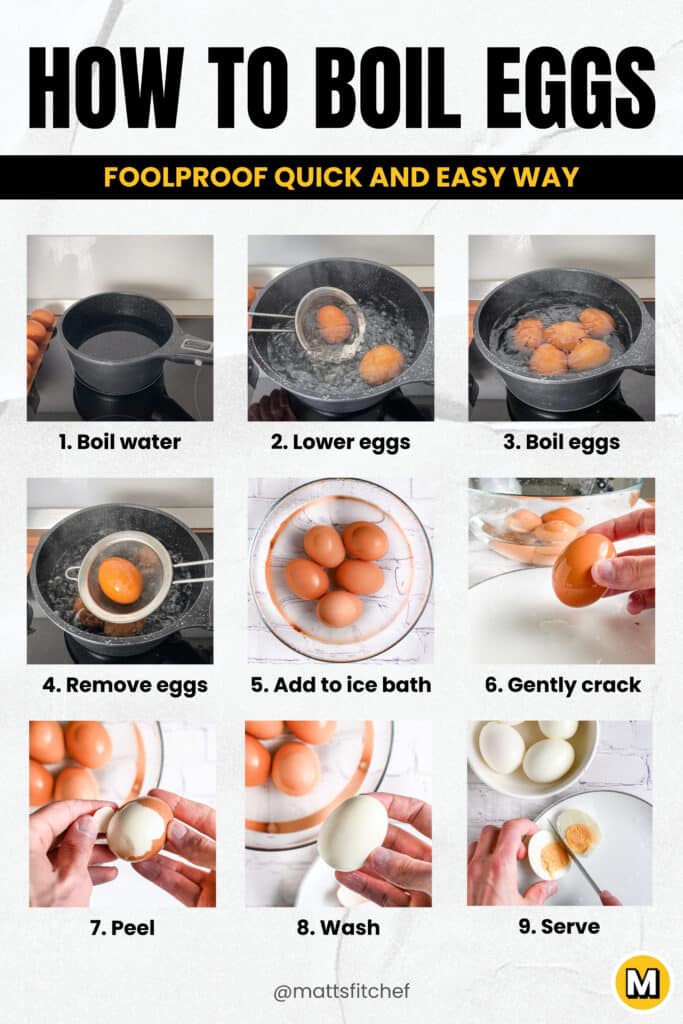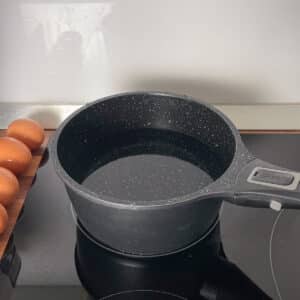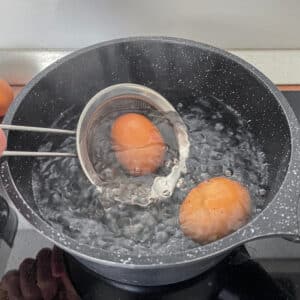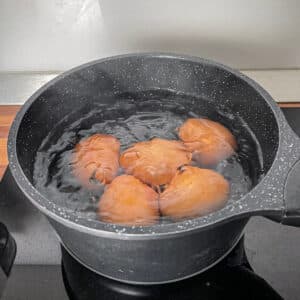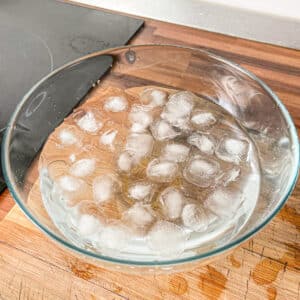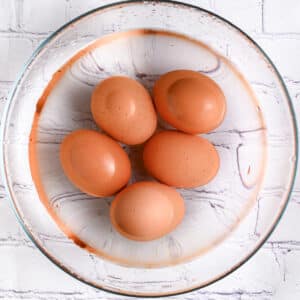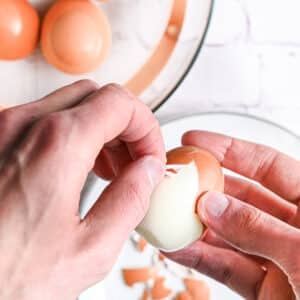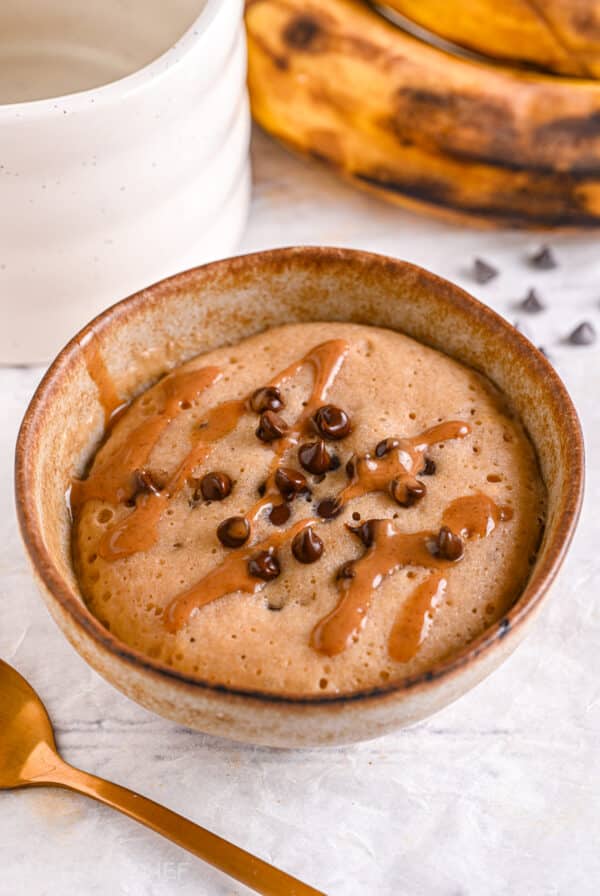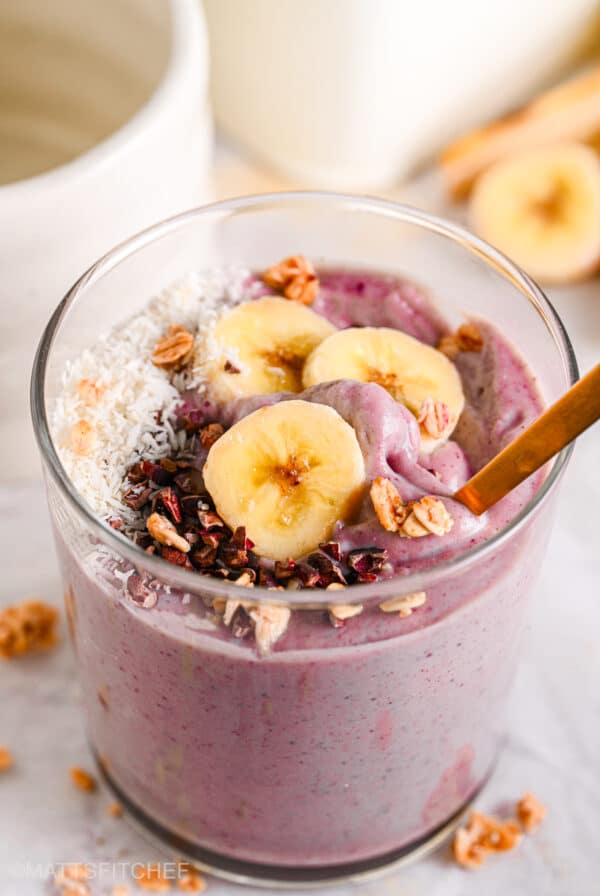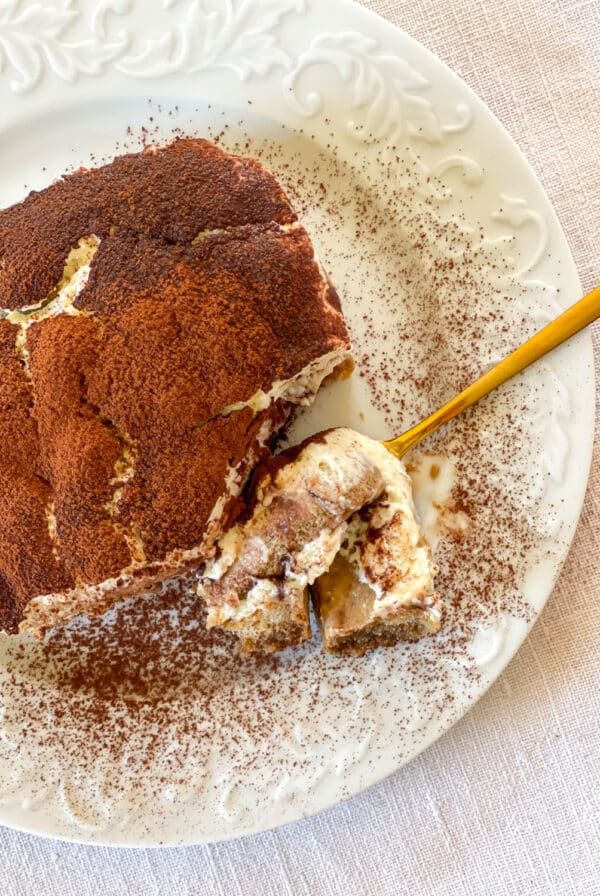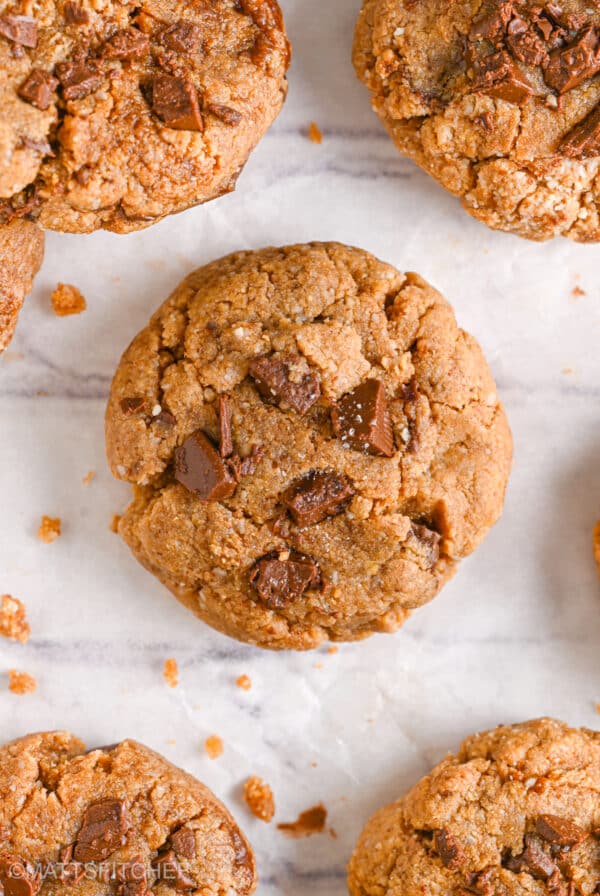As an Amazon Associate I earn from qualifying purchases.
Learn how to make Hard Boiled Eggs perfect every time with this easy recipe. My simple method boils the water first, then cook eggs for 8-10 minutes. You will love that they peels so easily, also without ice bath!
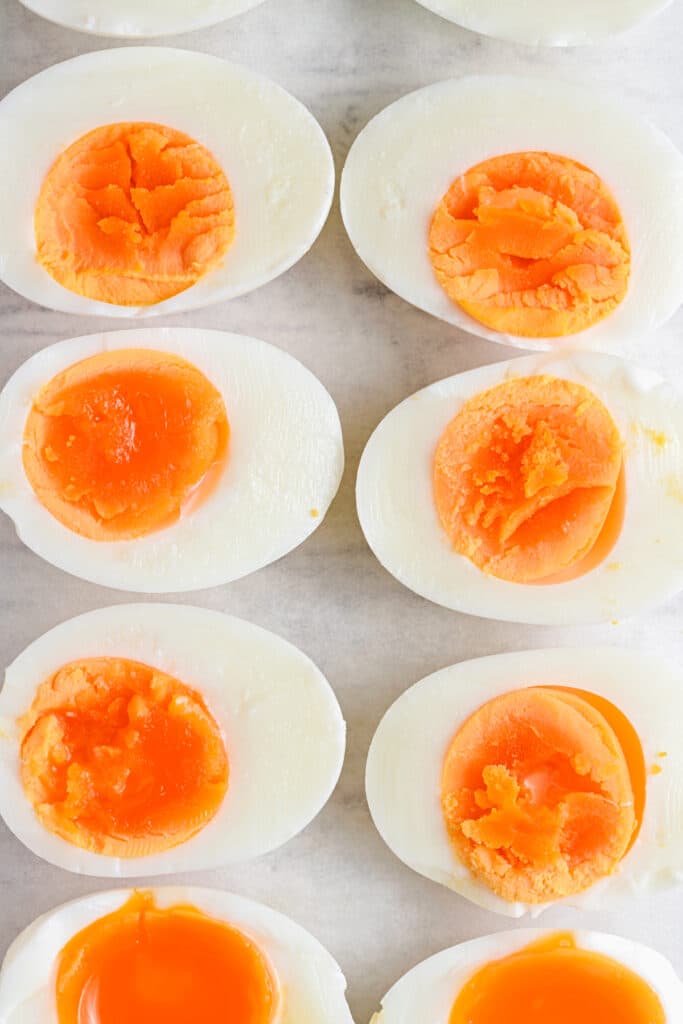
Once you learn how to boil eggs properly, you’ll have the perfect addition to toasts, breakfast plates, salads and ramen. Boiled eggs are healthy and packed with protein, plus they’re ideal for meal prepping.
Why is everyone making things so complicated? Out of curiosity, I recently asked Alexa “How do you make hard boiled eggs?” and the answer surprised me. Some methods suggest cooking them off the heat, others require a food thermometer to measure the water temperature. I seriously started questioning my knowledge. Since childhood, I’ve been making them as dad taught me. The easy always-perfect way which I’m about to share with you.
How to boil eggs
Boil water first, lower the heat so the shell doesn’t break, add eggs and cook back on gentle boiling. 8 minutes for perfect boiled eggs, 6 minutes if you prefer runnier yolks and 10 minutes for a firmer texture.
The best way to cook hard boiled eggs is very simple and it promises consistent results, perfect every time. Unfortunately the cold water approach can be unreliable — different pots take varying times to boil, and they retain heat differently. Plus, induction stovetops work unlike traditional ones. But don’t worry, my easy recipe eliminates all the guesswork and teaches you a foolproof method you’ll never forget. Let’s dive in!
- Step 1 – Boil water. Place a large pot on the stove and fill it with cold water. Ensure the water is enough to cover the eggs by at least 1 inch (2.5 cm). Turn on the heat to high and bring the water to a rolling boil. Do not cover the pot with a lid.
- Step 2 – Add eggs. Once it starts boiling, lower the heat to low/medium heat so that the water is no more bubbling. Use a large spoon or a skimmer to lower the eggs into the pot, being gentle to prevent them from cracking.
- Step 3 – Boil eggs. Increase the heat back up to medium/high so the water starts boiling gently. Cook 6 minutes for runny yolks, 8 minutes for soft boiled eggs, 10 minutes for hard boiled eggs, and 12 minutes for fully firm yolks.
- Step 4 – Prep ice bath. Prepare the ice bath while they’re boiling. Fill half of a bowl with cold water and half with ice cubes. If you don’t have ice cubes, fill the bowl with cold water only.
- Step 5 – Let cool. Once the eggs are ready, use kitchen tongs, a skimmer or a spoon to remove them from the pot. Place immediately into the ice bath and let cool for at least 10 minutes.
- Step 6 – Peel. Gently tap them on a hard surface to crack the shell. Start peeling from the wider end where the air pocket is, the shell should come off easily. Run under cool water to remove any residual of shell, then serve or store for later.
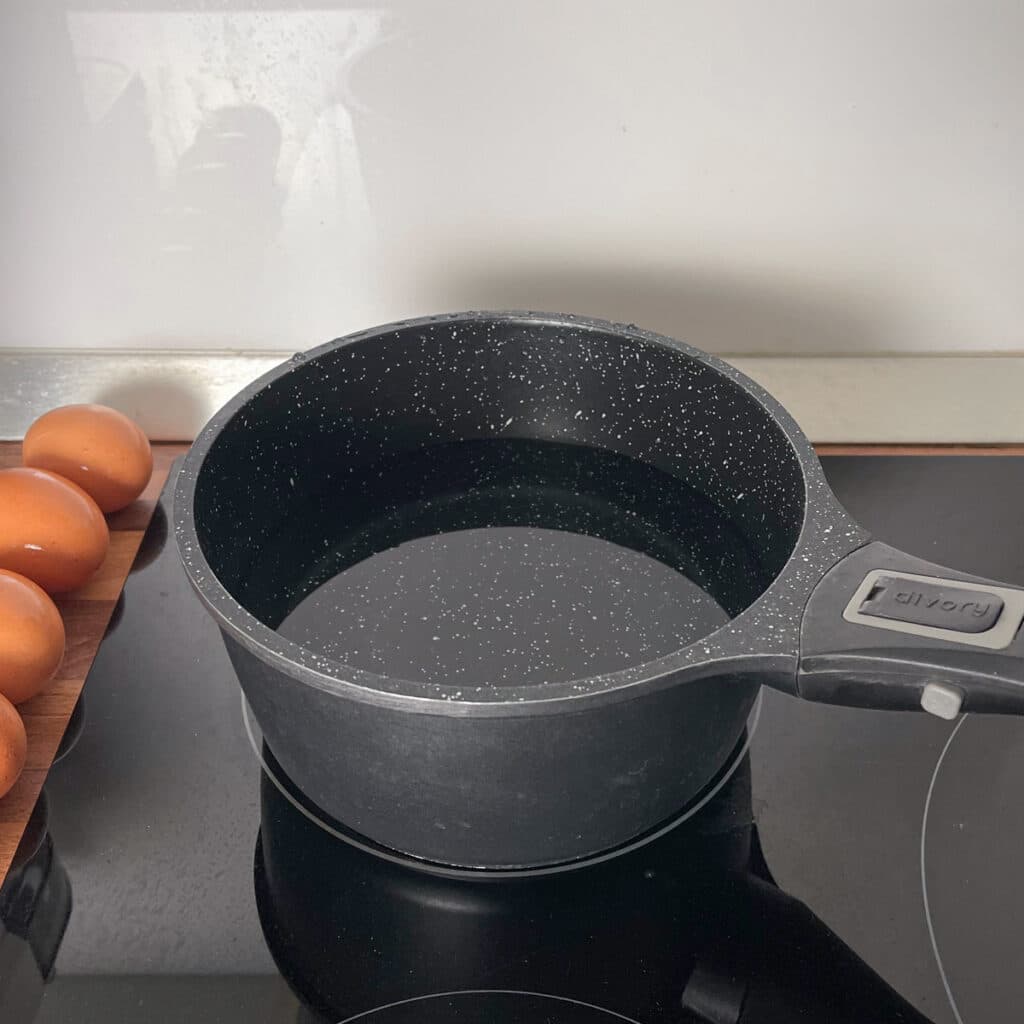
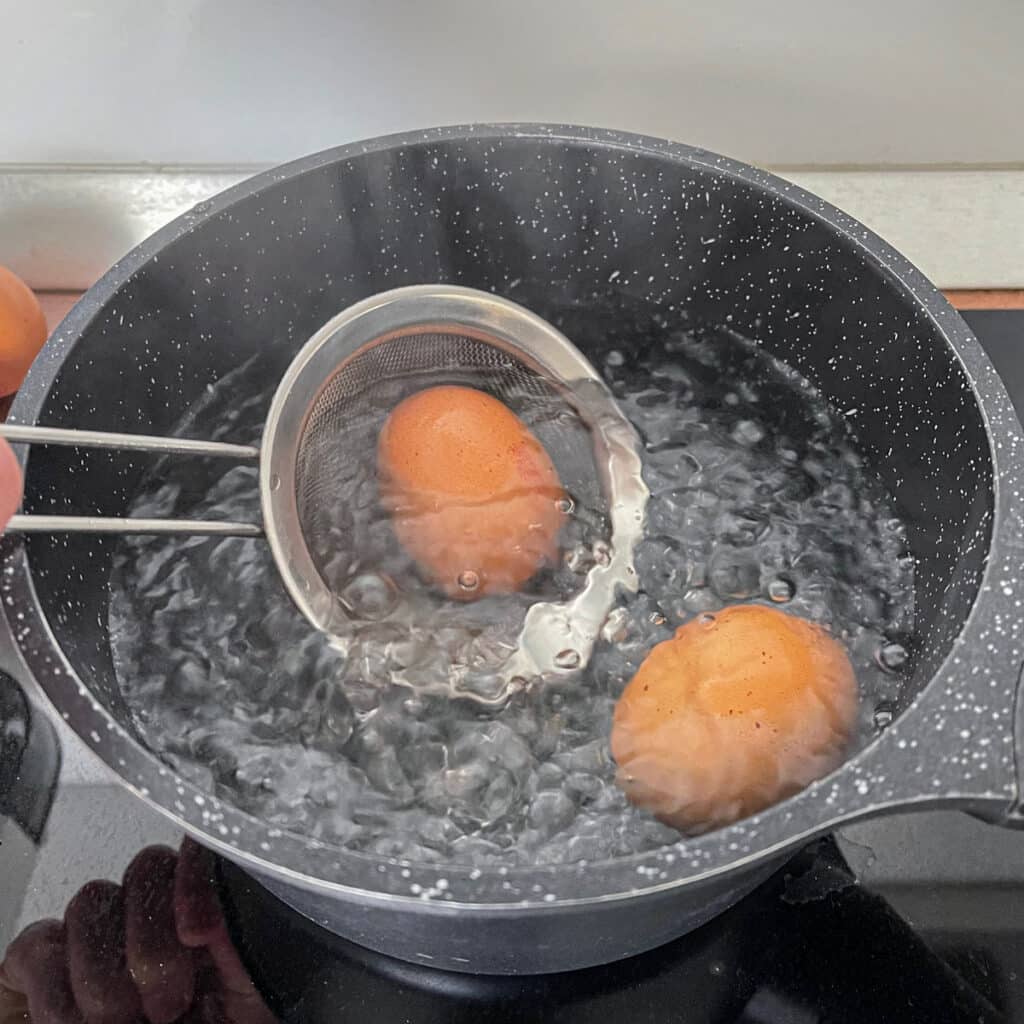
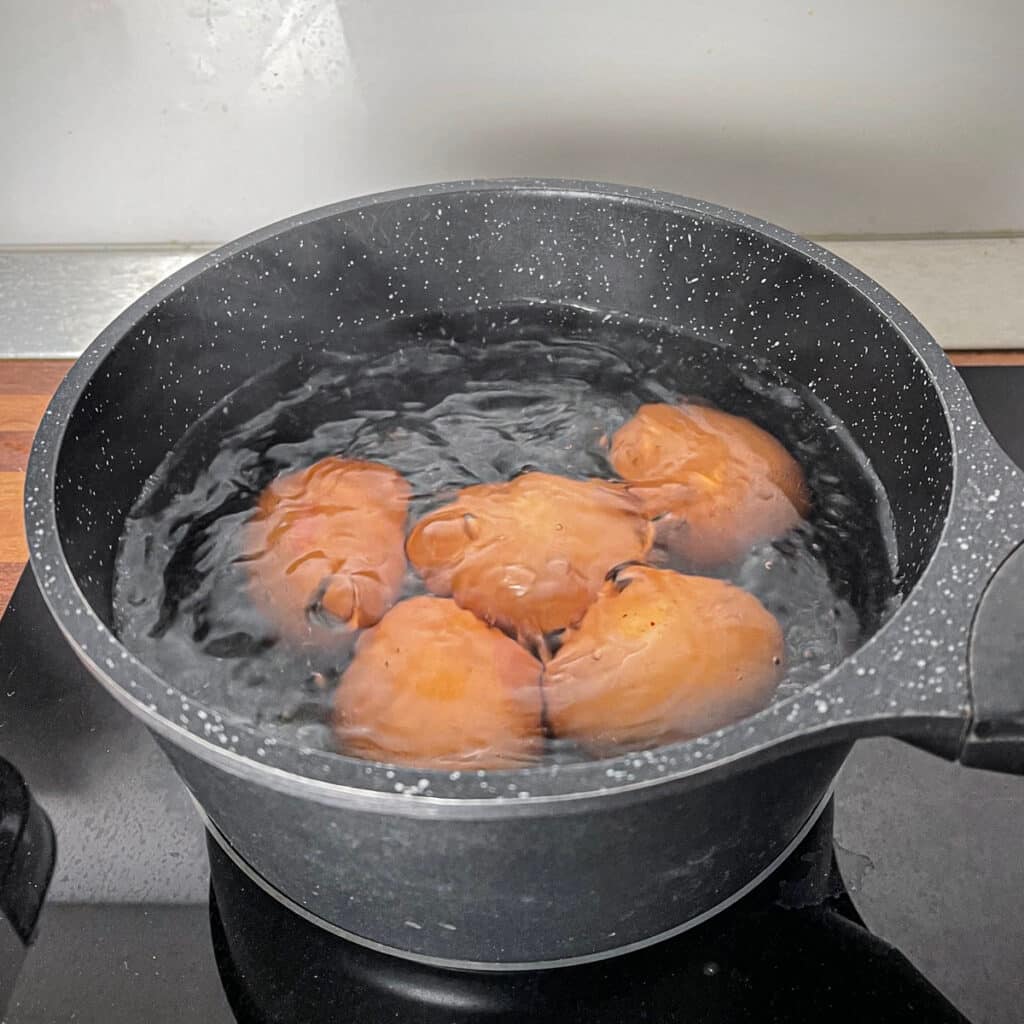
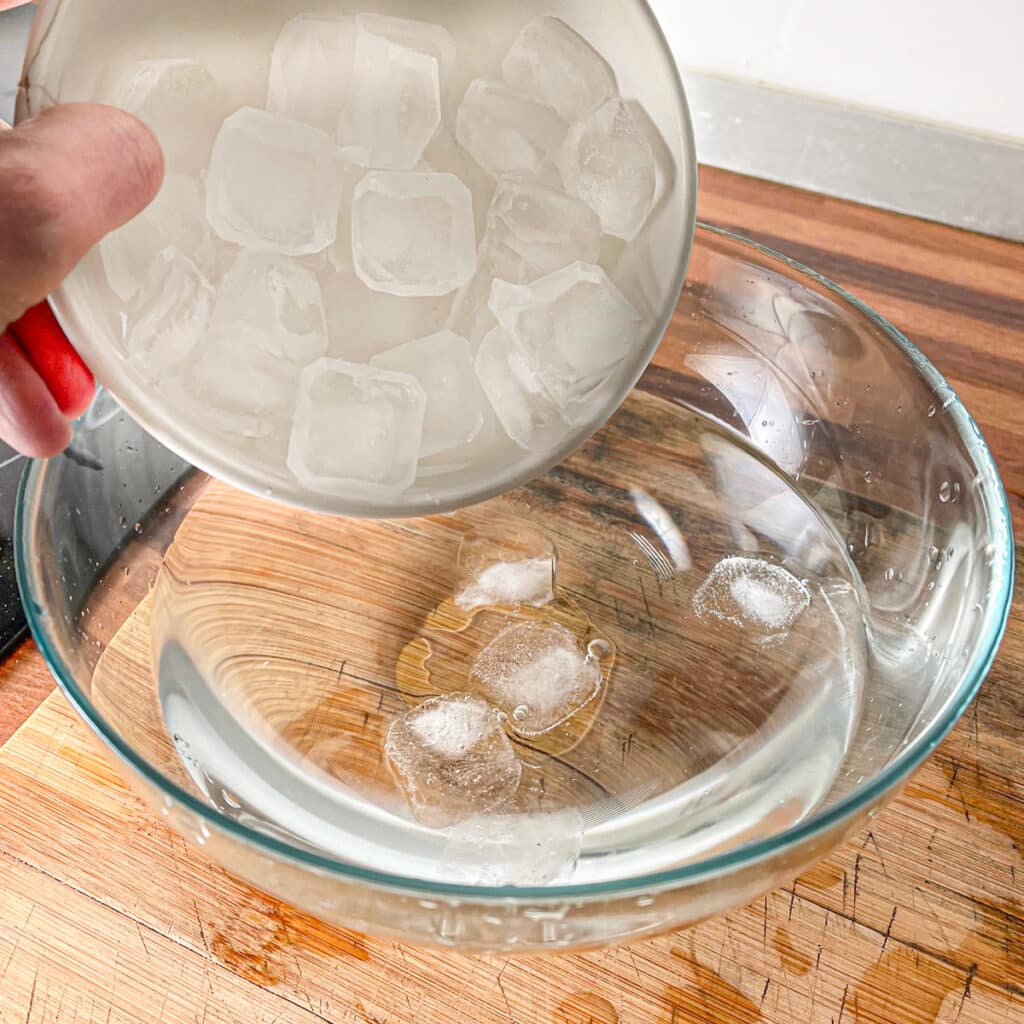
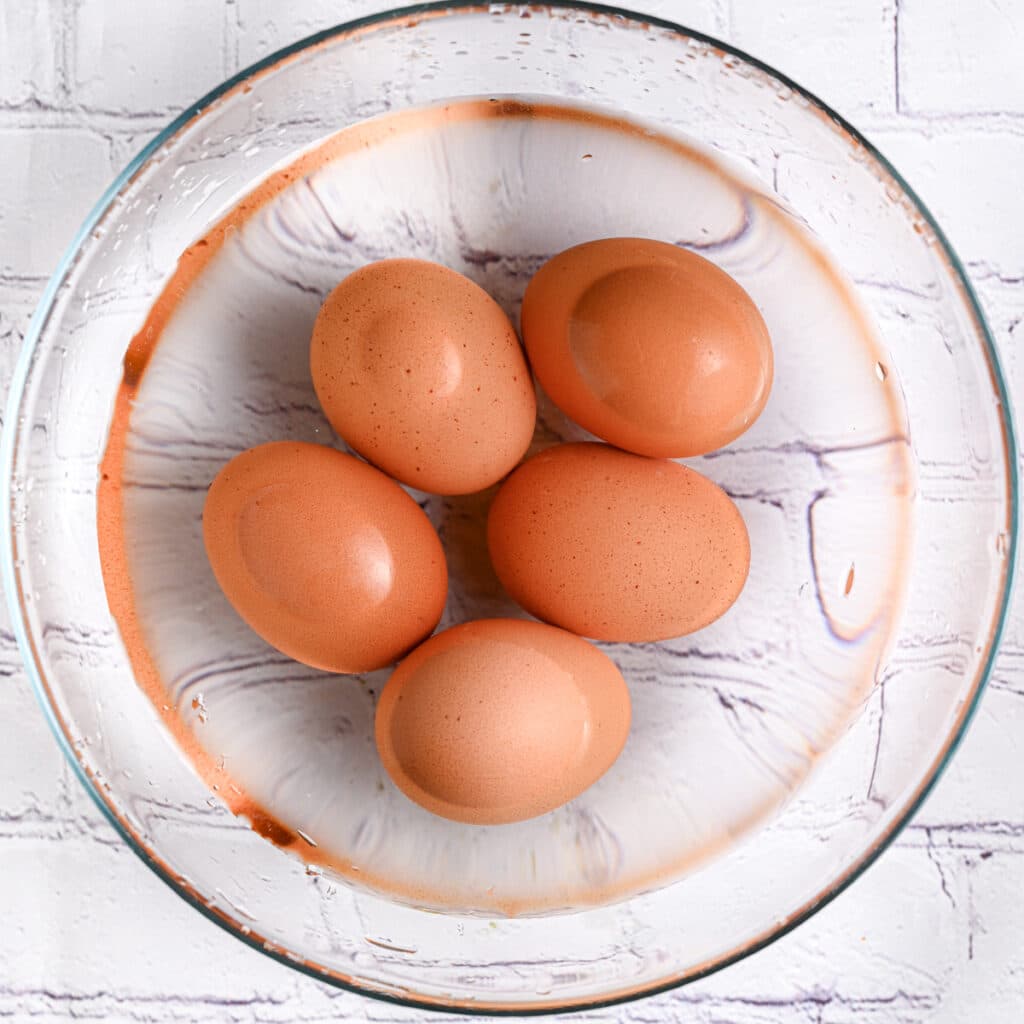
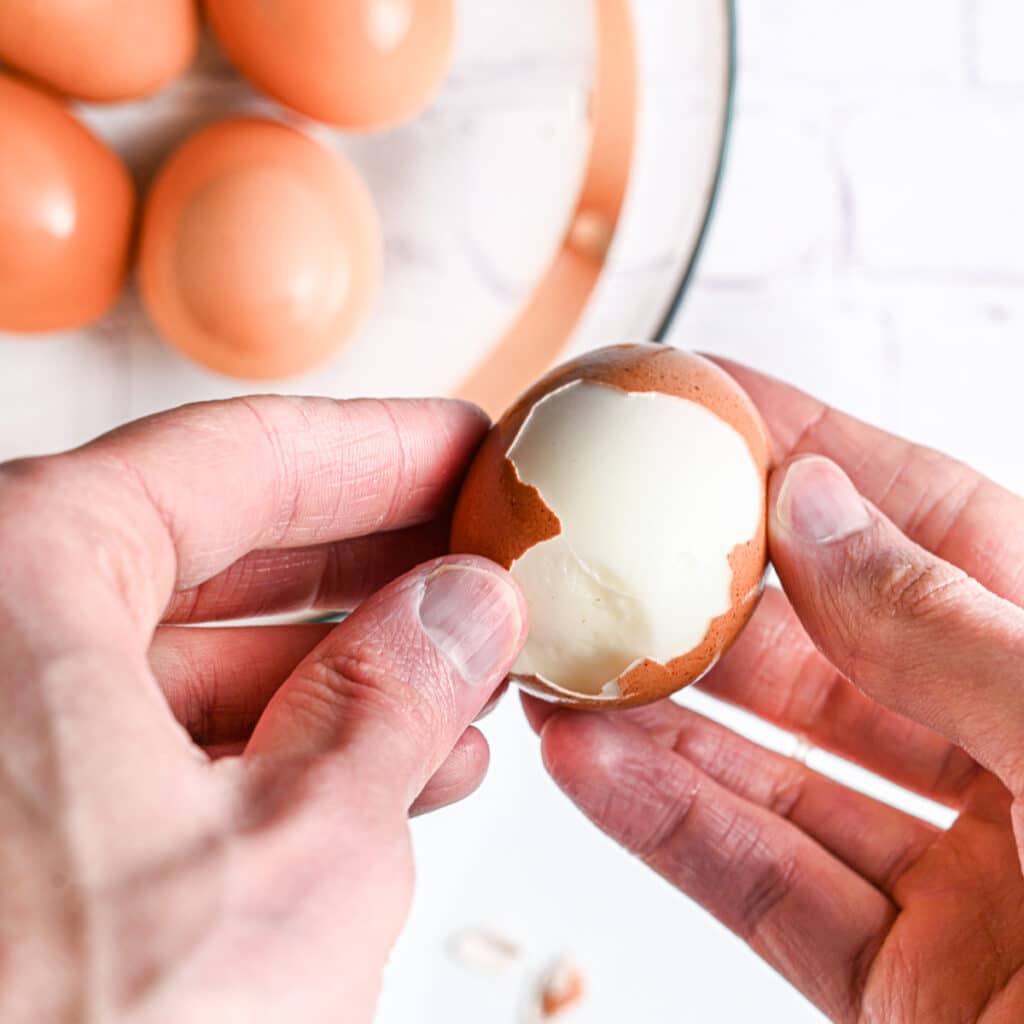
How long to hard boil eggs
The following cooking times apply to large eggs (1.8 oz/50 g), cold from the fridge. The timer starts as soon as your eggs touch the hot water. After the desired time has passed, transfer them immediately into a bowl filled with iced water.
- 6 minutes: Jammy eggs with runny yolk and soft white.
- 8 minutes: Perfect soft boiled with soft yolk and firmer white.
- 10 minutes: Perfect hard boiled with creamy yolk and firm white.
- 12 minutes: Hard boiled with firmer yolk and fully set white.
- 14 minutes: Overcooked, with chalky yolk and rubbery white (not recommended).
How to prevent cracking
Here are 4 simple tips to stop eggs from cracking while boiling. The first 3 are a must, the last is optional.
- Lower the heat – When adding the eggs to the water, make sure you lower the heat to stop bubbling. Once they’re in the pot, you can bring the heat back up to a gentle boiling. Important, do not cover with a lid.
- Use a spoon or skimmer – Be sure to gently lower the eggs in pot using a spoon or skimmer, do not drop them “violently” into the water.
- Cook few at once – Do not overcrowd the pot, you should hard boil maximum 4 to 6 eggs at once.
- Add vinegar or salt – Adding 1 teaspoon of vinegar and/or ½ teaspoon of salt to the water ensures that they won’t crack while boiling. The vinegar also helps keep the whites inside, shall they break.
How to peel hard boiled eggs
- Prep – While the eggs are boiling, fill half of a medium bowl with cold water and half with ice cubes. As an alternative you can also skip the ice and use cold water only. Make sure you do this ahead to have it ready for when they are cooked.
- Cool – Once the eggs are ready, use kitchen tongs, a skimmer or a spoon to remove them from the pot. Place immediately into the ice bath and let cool for at least 10 minutes. If not using the ice, I recommend changing the water a couple of times so it remains cold.
- Crack – Crack one egg at a time by gently tapping it on a hard surface. Be careful not to smash the shell.
- Peel – Begin peeling from the wider end of the egg, where there’s often an air pocket. Look for the thin membrane between the shell and the white — if you can grab it, it will make peeling much easier.
- Clean – Quickly wash them under cool, running water to remove any piece of shell.
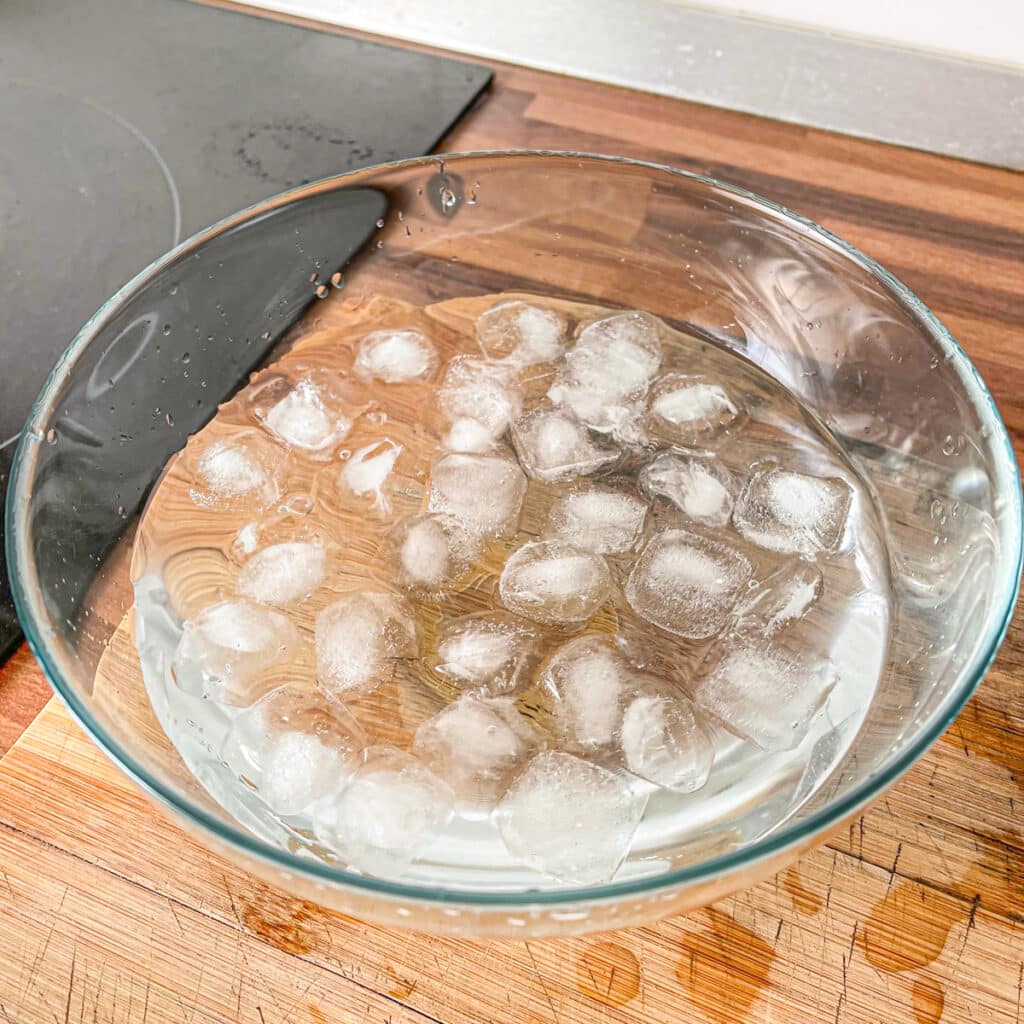
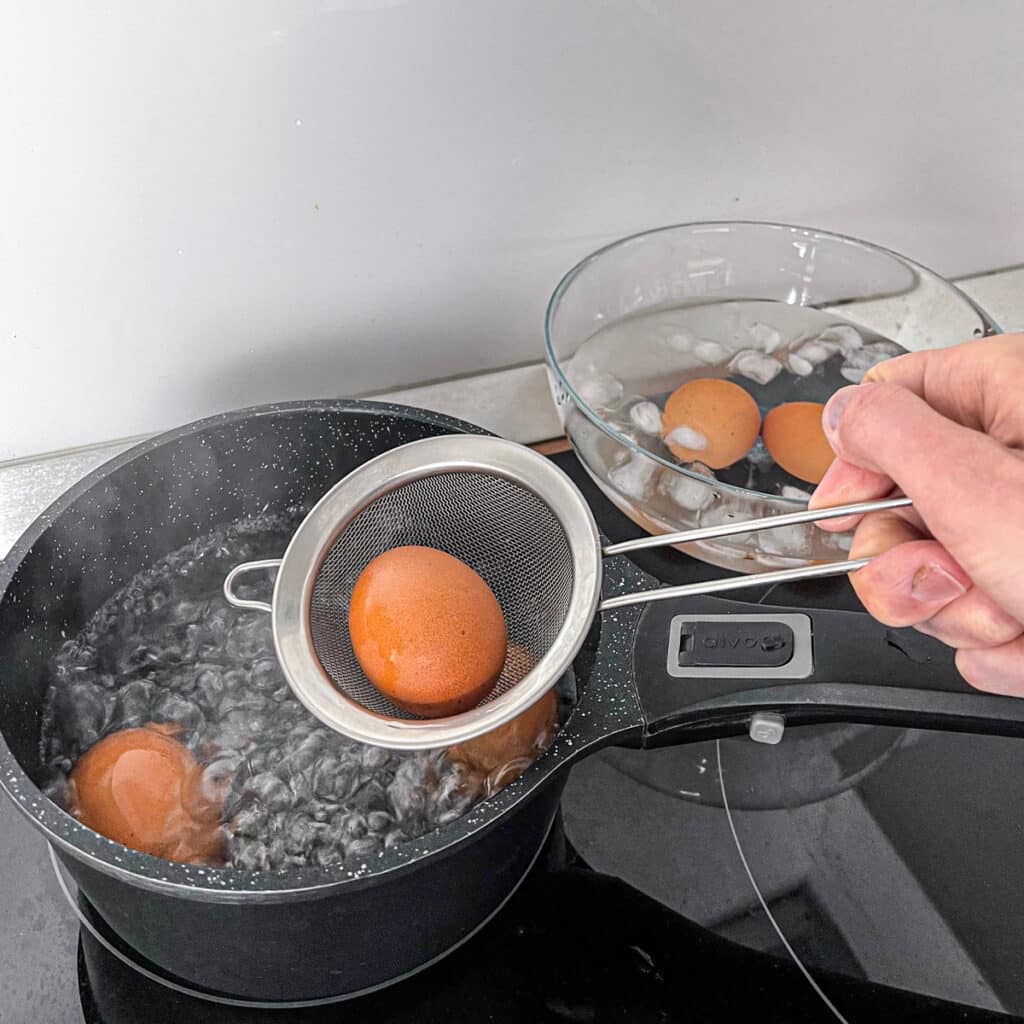

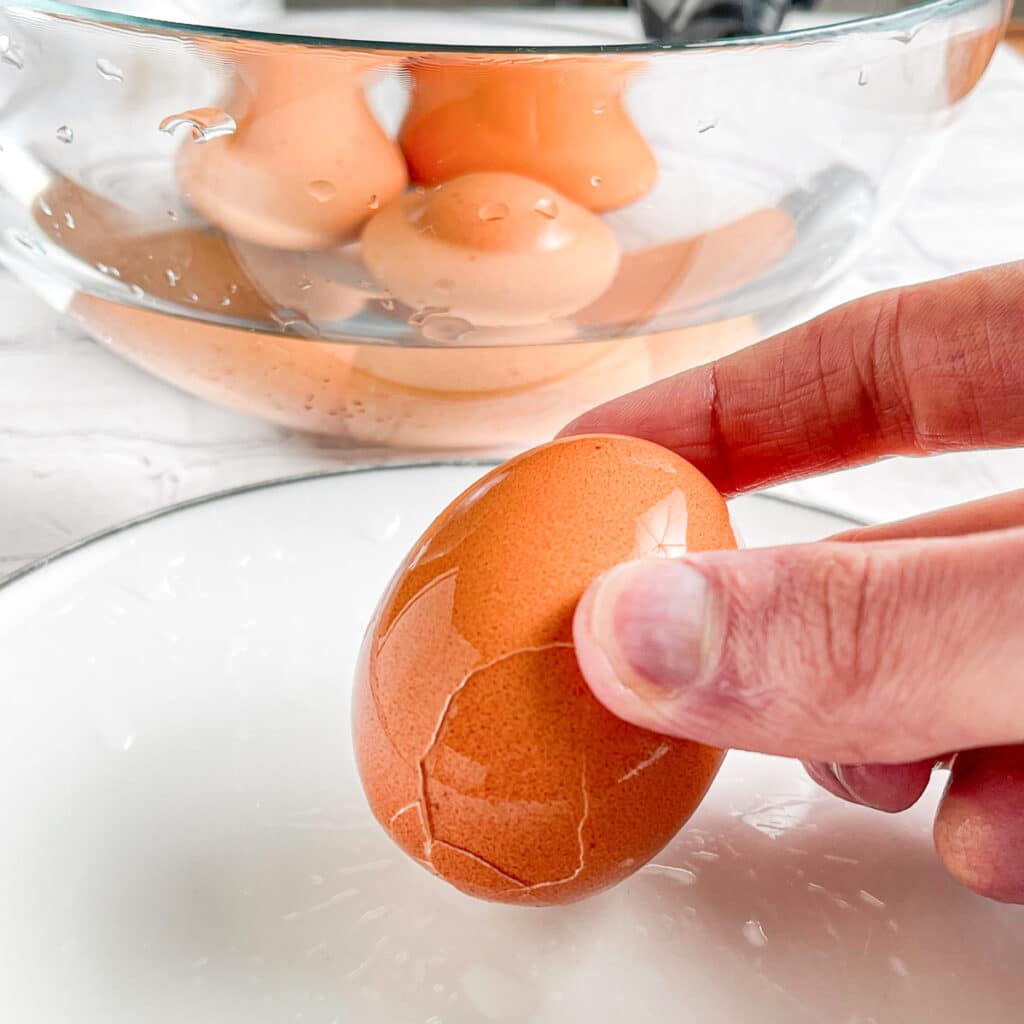
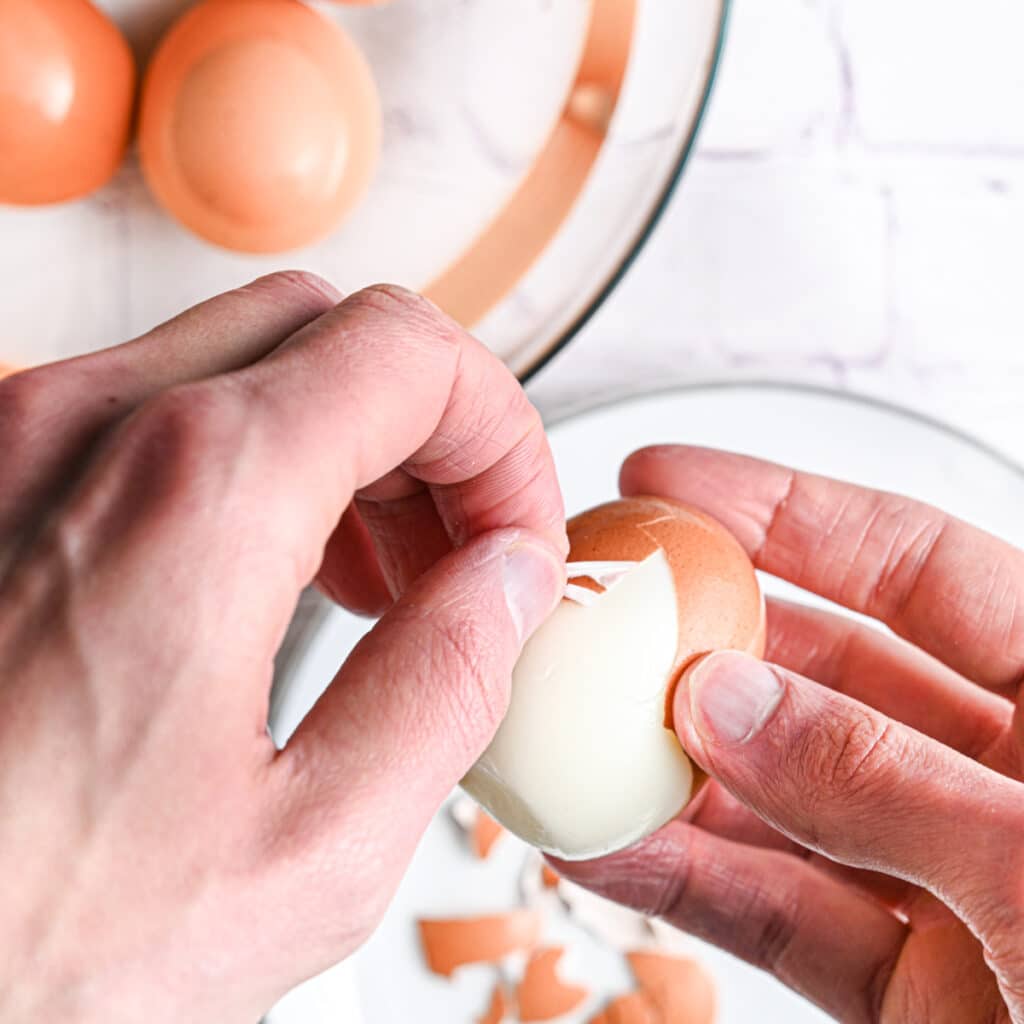
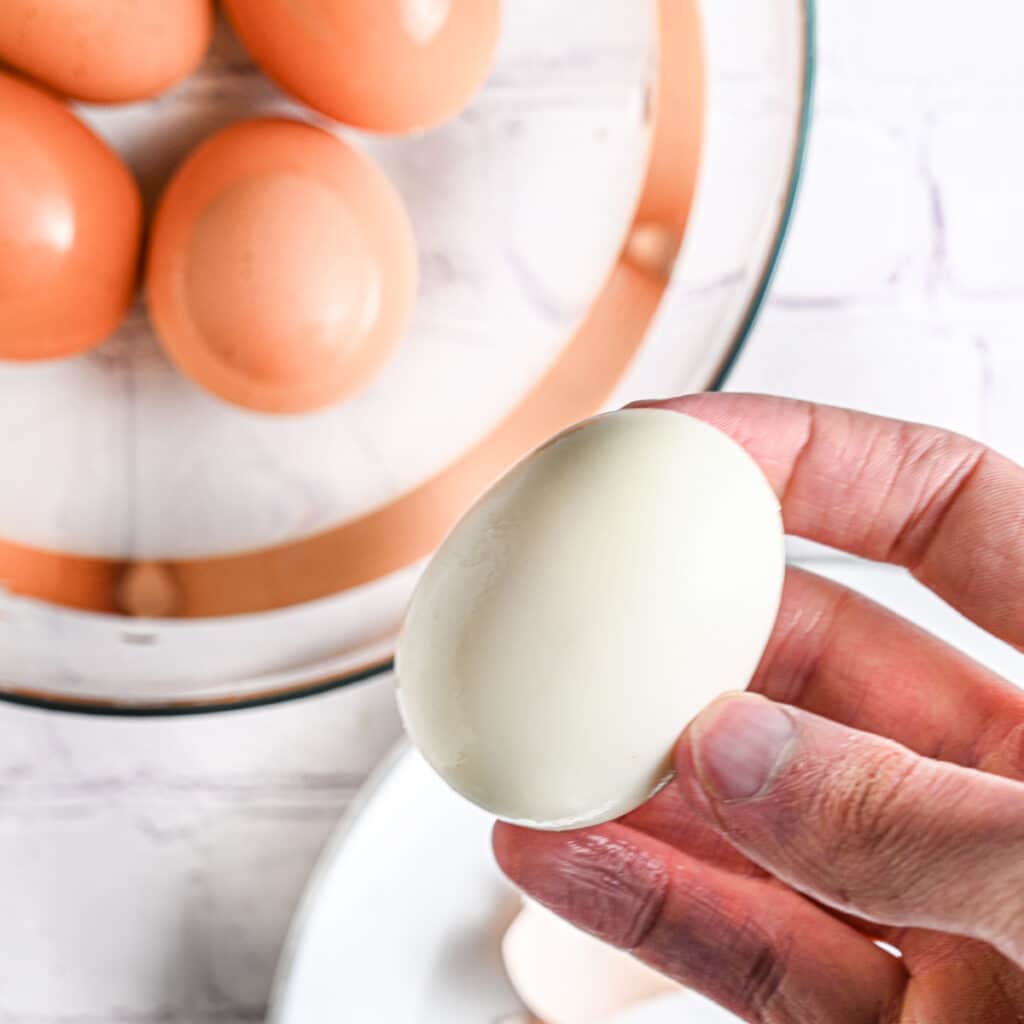
How to store and meal prep
Boiled eggs can be served immediately or they can be stored for later, they’re great for meal prep. You can store leftovers in the center of the fridge, either peeled or unpeeled. Unpeeled they will last for up to 6 days, peeled they will stay fresh for a maximum of 4 days. I generally prefer refrigerating them with shell on, they tend to peel more easily over time.
Freezing is not recommended. When frozen and thawed, the whites tend to become rubbery while yolks may lose taste. Since they are so easy to prep ahead, I suggest cooking a dozen (or as many as needed) on Sunday for the week. Keep them in the fridge for up to 6 days.
Success tips
- Cold eggs for perfect results – I recommend you hard boil eggs cold, straight from the fridge. Since the temperature plays a major role in how long they should boil, this remove any guesswork. Additionally, when cooked from cold the yolks tend to be creamier.
- Old eggs for easier peeling – One week old is ideal. As eggs age the pH level increases, which helps the thin inner membrane come off the white.
- Large pots for consistent cooking – For boiling 6, choose a pot with a diameter of at least 7 inches (18 cm), 8 inches (20 cm) even better. Leaving enough space between eggs helps them cook evenly without cracking.
- Enough water for covering – The water should cover eggs by at least 1 inch (2.5 cm), more is better than less. If the water level is too low, they won’t cook evenly.
- Cold water for better peeling – Placing hard boiled eggs in cold water stops the cooking process. A bowl filled with ice cubes and water is recommended, but alternatively you can also use cold water only. Leave them in a cold environment for at least 10 minutes.
Serving ideas
- Breakfasts – Whether jammy or hard boiled, they go well with a fresh slice of bread for avocado toast. I like serving mine with homemade protein bagels or homemade oat bread and some cottage cheese for more protein. For an English breakfast plate, pair with a dollop of baked beans, buttered toasts and bacon.
- Sandwiches – Make egg salad, then stuff it inside soft bread. Add sliced tomatoes and fresh lettuce for more nutrients.
- Salads – Whether freshly boiled or meal prepped from the fridge, toss them inside a fresh salad for a boost of protein, nutrients and taste. Spinach salad is Matteo’s favorite. You can also use for a festive deviled egg potato salad.
- Bowls – Assemble a nourishing bowl with whole grains such as quinoa or brown rice, vegetables, creamy avocado and hard boiled eggs for a complete meal. You can add more protein with chicken breast, protein cheese, air fryer tofu and crunchy air fryer chickpeas. I also love them as a topping for a high protein savory oatmeal.
- Soups – Level up your next soup with a boost of protein and flavor. At home, we love them with this Tuscan white bean soup and my high protein soup. My girlfriend often eat them in ramen or noodle soups.
Nutrition facts
One large boiled egg (about 1.8 oz or 50 grams) provides roughly 70 calories, 6 grams of protein, 5 grams of fat (1.4 grams of which are saturated fat) and only 0.4 grams of carbohydrates.
Precise nutritional values may vary depending on the sizes and the ratio of yolk to white, as most fats and vitamins (like vitamin D and B12) are in the yolk, while the white is rich in protein and poor in calories. A small egg contains around 55 kcal, a medium egg about 65 kcal, and an extra-large egg roughly 85 calories. Keep in mind that these are nutritional values for hard boiled eggs only, served without any condiment such as olive oil or sauces.
Hard boiled eggs time chart
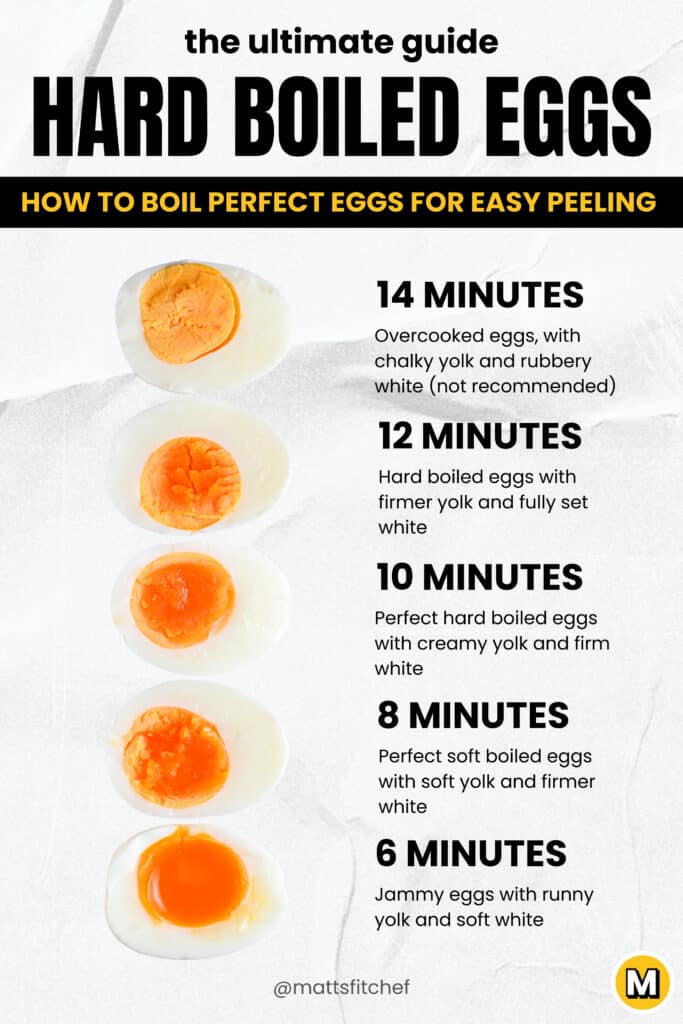
More ways to cook eggs
- Microwave scrambled eggs
- Air fryer hard boiled eggs
- Air fryer soft boiled eggs
- Egg white frittata
- Sunny side up eggs
- Over easy eggs
- Over medium eggs
- Over hard eggs
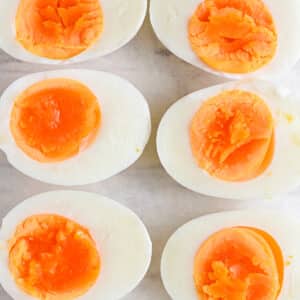
Hard Boiled Eggs
Ingredients
- 4 to 6 large eggs, cold from the fridge
Instructions
- Place a large pot on the stove and fill it with cold water. Ensure the water is enough to cover the eggs by at least 1 inch (2.5 cm).
- Turn on the heat to high and bring the water to a rolling boil. Do not cover the pot with a lid.
- Once it starts boiling, lower the heat to low/medium heat so that the water is no more bubbling. Use a large spoon or a skimmer to lower the eggs into the pot, being gentle to prevent them from cracking.
- Increase the heat back up to medium/high so the water starts boiling gently. Cook 6 minutes for runny yolks, 8 minutes for soft boiled eggs, 10 minutes for hard boiled eggs, and 12 minutes for fully firm yolks.
- Prepare the ice bath while eggs are boiling. Fill half of a bowl with cold water and half with ice cubes. If you don't have ice cubes, fill a bowl with cold water only.
- Once the eggs are ready, use kitchen tongs, a skimmer or a spoon to remove them from the pot. Place immediately into the ice bath and let cool for at least 10 minutes.
- Gently tap them on a hard surface to crack the shell. Start peeling from the wider end where the air pocket is, the shell should come off easily. Run under cool water to remove any residual of shell, then serve or store for later.
Notes
Recommended cooking times
- 6 minutes: Jammy with runny yolk and soft white.
- 8 minutes: Perfect soft boiled with soft yolk and firmer white.
- 10 minutes: Perfect hard boiled with creamy yolk and firm white.
- 12 minutes: Hard boiled with firmer yolk and fully set white.
- 14 minutes: Overcooked, with chalky yolk and rubbery white (not recommended).
Storage directions
- Store leftovers in the center of the fridge, not the door, for optimal freshness. Unpeeled, they can last up to 6 days, while peeled will stay fresh for up to 4 days.
- Freezing hard boiled eggs is not recommended. When frozen and thawed, the whites tend to become rubbery.
Additional tips
- This recipe is developed and tested with large sized eggs. If boiling XL eggs increase time by 30 seconds, if using jumbo eggs cook for 45 seconds to 1 minute more.
- I recommend cold eggs from the fridge.
- Older eggs peel more easily, ideally when they’re about one week old.
- Use a large pot. For boiling 6, choose a pot with a diameter of at least 7 inches (18 cm), 8 inches (20 cm) even better.
- You can add to the water 1 teaspoon of vinegar and/or ½ teaspoon of salt to prevent cracking and facilitate peeling.
- Cook no more than 6 eggs at a time.
- If you don’t have a tray of ice, fill a large bowl with cold tap water to allow the eggs to cool. Be sure to change the water frequently to maintain a cold environment.
Nutrition
